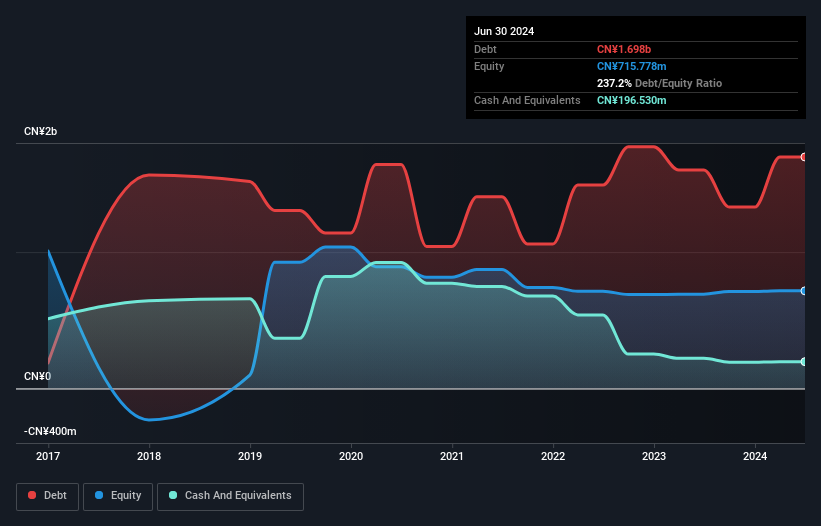- Hong Kong
- /
- Specialty Stores
- /
- SEHK:1817
Mulsanne Group Holding (HKG:1817) Has A Somewhat Strained Balance Sheet

The external fund manager backed by Berkshire Hathaway's Charlie Munger, Li Lu, makes no bones about it when he says 'The biggest investment risk is not the volatility of prices, but whether you will suffer a permanent loss of capital.' So it might be obvious that you need to consider debt, when you think about how risky any given stock is, because too much debt can sink a company. Importantly, Mulsanne Group Holding Limited (HKG:1817) does carry debt. But is this debt a concern to shareholders?
Why Does Debt Bring Risk?
Debt is a tool to help businesses grow, but if a business is incapable of paying off its lenders, then it exists at their mercy. Ultimately, if the company can't fulfill its legal obligations to repay debt, shareholders could walk away with nothing. While that is not too common, we often do see indebted companies permanently diluting shareholders because lenders force them to raise capital at a distressed price. Having said that, the most common situation is where a company manages its debt reasonably well - and to its own advantage. When we think about a company's use of debt, we first look at cash and debt together.
View our latest analysis for Mulsanne Group Holding
What Is Mulsanne Group Holding's Net Debt?
The image below, which you can click on for greater detail, shows that at June 2024 Mulsanne Group Holding had debt of CN¥1.70b, up from CN¥1.60b in one year. However, it also had CN¥196.5m in cash, and so its net debt is CN¥1.50b.

A Look At Mulsanne Group Holding's Liabilities
Zooming in on the latest balance sheet data, we can see that Mulsanne Group Holding had liabilities of CN¥2.10b due within 12 months and liabilities of CN¥285.3m due beyond that. Offsetting these obligations, it had cash of CN¥196.5m as well as receivables valued at CN¥186.1m due within 12 months. So its liabilities outweigh the sum of its cash and (near-term) receivables by CN¥2.01b.
This deficit casts a shadow over the CN¥593.9m company, like a colossus towering over mere mortals. So we definitely think shareholders need to watch this one closely. After all, Mulsanne Group Holding would likely require a major re-capitalisation if it had to pay its creditors today.
We measure a company's debt load relative to its earnings power by looking at its net debt divided by its earnings before interest, tax, depreciation, and amortization (EBITDA) and by calculating how easily its earnings before interest and tax (EBIT) cover its interest expense (interest cover). The advantage of this approach is that we take into account both the absolute quantum of debt (with net debt to EBITDA) and the actual interest expenses associated with that debt (with its interest cover ratio).
Weak interest cover of 1.6 times and a disturbingly high net debt to EBITDA ratio of 10.5 hit our confidence in Mulsanne Group Holding like a one-two punch to the gut. The debt burden here is substantial. The silver lining is that Mulsanne Group Holding grew its EBIT by 386% last year, which nourishing like the idealism of youth. If it can keep walking that path it will be in a position to shed its debt with relative ease. There's no doubt that we learn most about debt from the balance sheet. But it is Mulsanne Group Holding's earnings that will influence how the balance sheet holds up in the future. So if you're keen to discover more about its earnings, it might be worth checking out this graph of its long term earnings trend.
Finally, a business needs free cash flow to pay off debt; accounting profits just don't cut it. So we clearly need to look at whether that EBIT is leading to corresponding free cash flow. Happily for any shareholders, Mulsanne Group Holding actually produced more free cash flow than EBIT over the last two years. That sort of strong cash conversion gets us as excited as the crowd when the beat drops at a Daft Punk concert.
Our View
While Mulsanne Group Holding's level of total liabilities has us nervous. For example, its conversion of EBIT to free cash flow and EBIT growth rate give us some confidence in its ability to manage its debt. Taking the abovementioned factors together we do think Mulsanne Group Holding's debt poses some risks to the business. While that debt can boost returns, we think the company has enough leverage now. The balance sheet is clearly the area to focus on when you are analysing debt. However, not all investment risk resides within the balance sheet - far from it. For example Mulsanne Group Holding has 5 warning signs (and 3 which are significant) we think you should know about.
Of course, if you're the type of investor who prefers buying stocks without the burden of debt, then don't hesitate to discover our exclusive list of net cash growth stocks, today.
If you're looking to trade Mulsanne Group Holding, open an account with the lowest-cost platform trusted by professionals, Interactive Brokers.
With clients in over 200 countries and territories, and access to 160 markets, IBKR lets you trade stocks, options, futures, forex, bonds and funds from a single integrated account.
Enjoy no hidden fees, no account minimums, and FX conversion rates as low as 0.03%, far better than what most brokers offer.
Sponsored ContentNew: Manage All Your Stock Portfolios in One Place
We've created the ultimate portfolio companion for stock investors, and it's free.
• Connect an unlimited number of Portfolios and see your total in one currency
• Be alerted to new Warning Signs or Risks via email or mobile
• Track the Fair Value of your stocks
Have feedback on this article? Concerned about the content? Get in touch with us directly. Alternatively, email editorial-team (at) simplywallst.com.
This article by Simply Wall St is general in nature. We provide commentary based on historical data and analyst forecasts only using an unbiased methodology and our articles are not intended to be financial advice. It does not constitute a recommendation to buy or sell any stock, and does not take account of your objectives, or your financial situation. We aim to bring you long-term focused analysis driven by fundamental data. Note that our analysis may not factor in the latest price-sensitive company announcements or qualitative material. Simply Wall St has no position in any stocks mentioned.
About SEHK:1817
Mulsanne Group Holding
An investment holding company, engages in the design, marketing, and sale of apparel products for men in Mainland China and Macau.
Fair value with questionable track record.
Market Insights
Community Narratives



